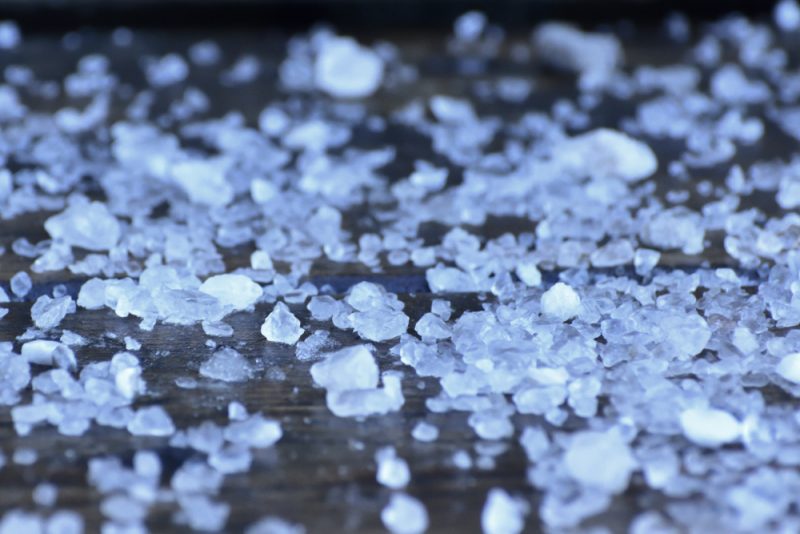
A recent study done by a team of scientists from Colorado State University and Colorado Parks & Wildlife determined that magnesium chloride, when applied to roadways, can ultimately have detrimental effects on important aquatic benthic macroinvertebrates (Kotalik, et al. 2017).
Aquatic macroinvertebrates are important to fish, amphibians, and other wildlife as a food source. Benthic macroinvertebrates are small organisms that have no internal skeleton system and are large enough to be seen with the naked eye, that live on or near the bottom of a stream or lake. Aquatic macroinvertebrates include, but not limited to, crayfish, snails, fairy shrimp, insect larvae such as mayflies, caddis flies, stoneflies, etc.
Aquatic macroinvertebrates are also are important indicators of water pollution and can be used to assess aquatic habitat quality. This is because different types of aquatic macroinvertebrates tolerate different stream conditions and levels of pollution, their presence or absence is used to indicate clean or polluted water.
The Colorado study was done to determine the effects of magnesium chloride when used as a deicer on macroinvertebrates. The study determined that:
- Important aquatic macroinvertebrates experienced “significant reductions in abundance, taxa richness, and community biomass”.
- The study concluded that macroinvertebrate groups, particularly Ephemeroptera (mayflies) and Plecoptera (stoneflies), were highly sensitive to the magnesium chloride in their mesocosm experiments.
- Effects on macroinvertebrate communities were observed at concentrations considerably lower than those reported from traditional laboratory toxicity tests, and below the U.S. EPA criterion value for chloride of 230-mg/L (Kotalik, et al. 2017).
- The authors also cite that field surveys of streams receiving elevated levels of major ions have shown that some aquatic insects, especially mayflies, are highly sensitive to salts and may be extirpated at very low concentrations (Pond et al., 2008; Cormier et al., 2013).”
The researchers go on to write “The conclusions that were made was that magnesium chloride road deicer has the potential to impair montane stream benthic communities at relatively low ionic concentrations, and regulatory agencies should manage for and establish regionally appropriate application rates for this stressor”. Also, they write “In order to mitigate the effects of road salts to stream benthic communities, we recommend that regulatory actions specifically manage for and establish regionally appropriate application rates” (Kotalik, et al. 2017). It is important to note that in Colorado, several mountain communities, including Aspen, Basalt and Summit County, have already taken action and have banned magnesium chloride.
It is important to note that magnesium chloride not only can potentially get transported into the environment from deicing purposes…its detrimental effects can also result when applying the same compound for dust control. In fact, “beyond winter, salt loading in groundwater and soils, and continued application of liquid deicer for dust mitigation on dirt roads, increases the duration and complexity of exposure. As a result, major ions are not ‘‘flushed’’ out of river systems during spring runoff and elevated ion concentrations can persist throughout the year (Kotalik, et al. 2017).
While the perceived low cost of magnesium chloride for dust control may be attractive, the long-term environmental impact may be impacted. Presently there may not be many viable alternatives for deicing, but for dust control, there are other environmentally better choices than magnesium chloride. Forward-thinking and environmentally conscious road managers are looking to products like Earthbind® an environmentally-friendly alternative to magnesium chloride for dust control.
References
Best, Allen, 2004. The de-icer that tames Western roads. High Country News. https://www.hcn.org/issues/270/14621
Cormier, S. M., G. W. Suter & L. Zheng, 2013. Derivation of a benchmark for freshwater ionic strength. Environmental Toxicology and Chemistry 32: 263–271.
Kotalik, C.J., W.H. Clements, & P. Cadmus, 2017. Effects of magnesium chloride road deicer on montane stream benthic communities. Hydrobiologia 799 (1), 193-202
Pond, G. J., M. E. Passmore, F. A. Borsuk, L. Reynolds & C. J. Rose, 2008. Downstream effects of mountaintop coal mining: comparing biological conditions using family-and genus-level macroinvertebrate bioassessment tools. Journal of the North American Benthological Society 27: 717–737.
